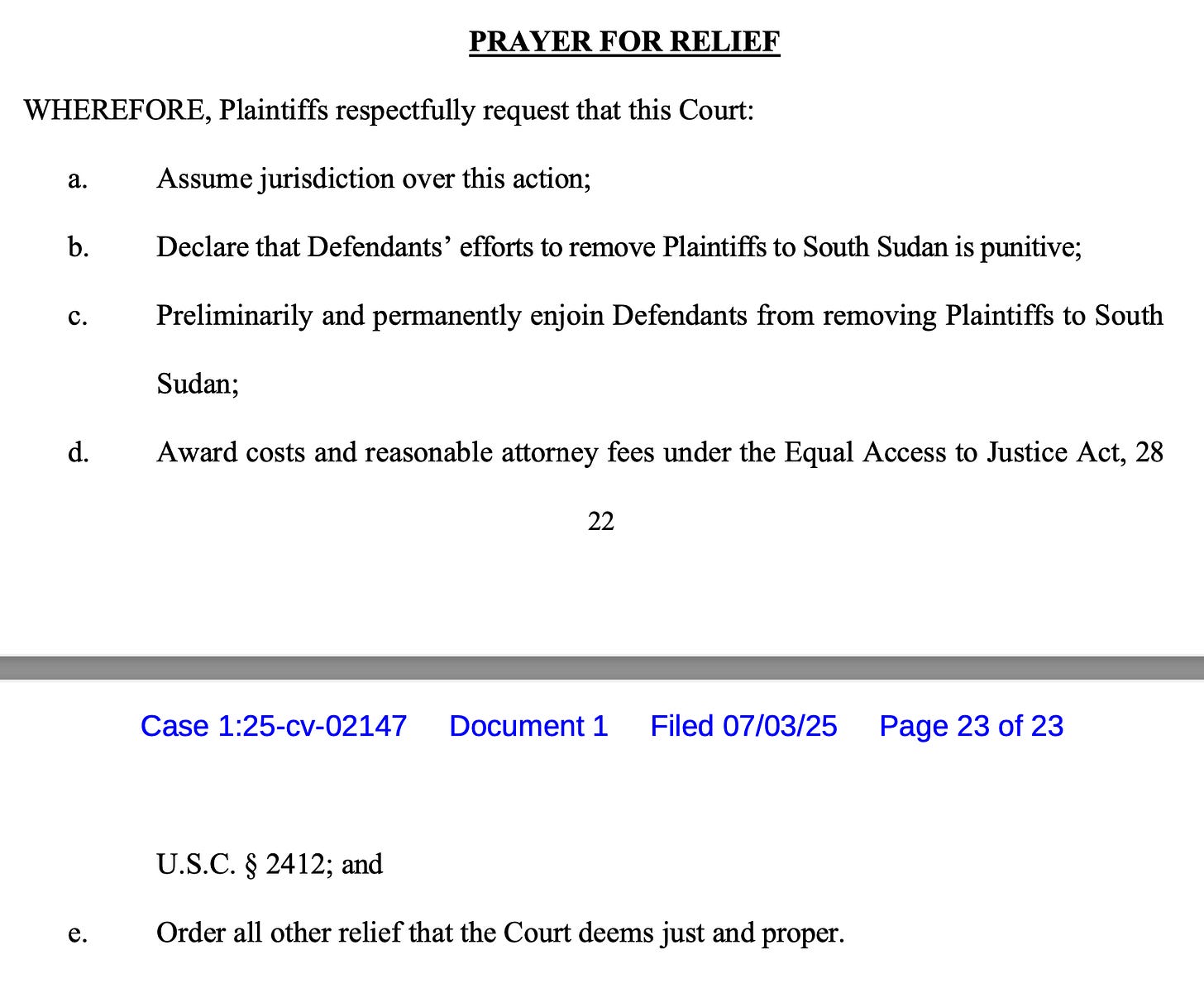After earlier judicial action, courts allow Trump admin to send men to South Sudan
Update: An initial stay on the Fourth of July gave way to a later order denying relief based on past SCOTUS orders in the matter. The men were later sent to South Sudan.
[Note: As detailed below in the update, the eight men were deported to South Sudan by Saturday.]
After a hearing on Friday, U.S. District Judge Randolph Moss transferred a new case filed Thursday night to protect the eight men the U.S. wants to send to South Sudan to the federal court in Massachusetts where a related case has been pending.
On Friday morning, Moss had issued an administrative stay blocking the Trump admin from "moving, transferring, or removing from U.S. custody" the eight men while his stay remains in effect. Lawyers and advocates have been fighting the administration’s effort to deport people to countries like South Sudan, where even the Trump administration State Department urges Americans not to travel to due to the dangerous conditions.
At the hearing’s conclusion a little after 3:00 p.m., Moss agreed to keep the administrative stay in place until 4:30 p.m. to allow his court to “effectuate the transfer.” He urged lawyers for the men to contact the Massachusetts court immediately to seek any further relief there.
The new habeas action argues the effort is punitive and, as such, unconstitutional.
A Justice Department lawyer told Moss at the Friday hearing that a flight is scheduled for 7 p.m. Eastern Time today to take the men to South Sudan.
The new habeas action, a copy of which was provided to Law Dork, was filed on Thursday evening after the U.S. Supreme Court’s “clarification” order blocking the remedy order to provide those eight men with due process before such a deportation.
That case is the Massachusetts case Moss referenced, before U.S. District Judge Brian Murphy, in a class-action case filed before the U.S. efforts to send the men to South Sudan. The case is about all third country removals — deportations to a country other the the person’s country of origin or another country in which they have legal status.
After granting the administrative stay in the new habeas action on Friday morning, Moss held a quickly scheduled hearing starting at 12:30 p.m. Friday.
Many of the questions to the petitioners’ lawyers were about whether the new filing before the D.C. District Court was appropriate in light of the other case.
The petitioners’ lawyer argued that this is a different case because its claim is that the action of removal to South Sudan should be barred as a “punitive” measure. It is not a claim, as in the other case, about the process involved in third country removals, they argued.
When the government called the new action “abuse of process” in light of the Supreme Court’s earlier orders in the case, Moss pushed back.
“The precise basis of the legal claim” is different from the third country removals case, the Justice Department lawyer then acknowledged.
Moss took a recess at 1:40 p.m. to allow the Justice Department lawyer to obtain some additional information. Court went back into session at 2:30 p.m., and Moss reached the decision shortly after asking some follow-up questions.
It was clear throughout the hearing that the transfer question was central to Moss due to his “claim-splitting” concerns — that the plaintiffs were bringing multiple similar cases in different jurisdictions seeking a different result — and ultimately it proved key to Moss’s decision.
The hearing was held on the Fourth of July — a federal holiday and another reminder of the constant work of the federal district courts.
[Update: 4:25 p.m. July 5: After the transfer of the case on July 4, U.S. District Judge Brian Murphy denied a request for a further protection for the eight men.
Specifically, Murphy found that the prior Supreme Court orders in the class-action case “binding on this new petition, as Petitioners are now raising substantially similar claims.” As such, he denied their emergency motion for a temporary restraining order.
The administration confirmed on Saturday that the men had been sent to South Sudan, the Associated Press reported, as the administration had been seeking to do since May 20.]
The distinct argument before the D.C. federal court in the new habeas action is that the effort to remove these eight men to South Sudan is punitive and should be barred permanently. At the least, they argue, the eight men’s removal should be stayed in the interim.
In their arguments for a temporary restraining order, which prompted Moss’s administrative stay and Friday’s hearing, the lawyers for the eight men argued that the government’s treatment of these men violates their Fifth Amendment due process rights, Sixth Amendment criminal rights, and Eight Amendment right against cruel and unusual punishments.
The case is Phan v. DHS (Docket No. 25-cv-2147).
This was a breaking news report. The final update was made at 4:25 p.m. July 5.








Unlike the six (6) seditionist justices on the Supreme Court, the lower courts continue their best to uphold the law and Constitution.
Thank you, Chris, for the post. It brightened up what otherwise was a pretty dreary 4th of July.
Thank you, Mr. Dork, for keeping us informed about this important action by judge Moss. Hopefully the SCOTUS can keep their greasy fingers off of this one.